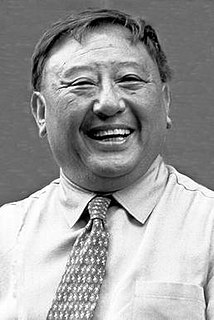A Quote by Pema Chodron
Having compassion starts and ends with having compassion for all those unwanted parts of ourselves. The healing comes from letting there be room for all of this to happen: room for grief, for relief, for misery, for joy.
Related Quotes
We think that the point is to pass the test or overcome the problem, but the truth is that things don't really get solved. They come together and they fall apart. Then they come together again and fall apart again. It's just like that. The healing comes from letting there be room for all of this to happen: room for grief, for relief, for misery, for joy. (10)
The wisdom that comes from having experienced heartbreak cannot be bequeathed; it can only be gained through experience. And having truly felt it, we are far more likely to have compassion for others. Anything that takes us close to true compassion takes us closer to what will one day be an experience of even greater joy.
Compassion asks us to go where it hurts, to enter into the places of pain, to share in brokenness, fear, confusion, and anguish. Compassion challenges us to cry out with those in misery, to mourn with those who are lonely, to weep with those in tears. Compassion requires us to be weak with the weak, vulnerable with the vulnerable, and powerless with the powerless. Compassion means full immersion in the condition of being human.
What is called generosity is really compassion. In the Shin'ei it is written "Seen from the eye of compassion, there is noone to be disliked. One who has sinned is to be pitied all the more." There is no limit to the breadth and depth of ones heart. There is room enough for all. That we still worship the sages of the three ancient kingdoms is because their compassion reaches us yet today.
As Gandhi wisely points out, even as we serve others we are working on ourselves; every act, every word, every gesture of genuine compassion naturally nourishes our own hearts as well. It is not a question of who is healed first. When we attend to ourselves with compassion and mercy, more healing is made available for others. And when we serve others with an open and generous heart, great healing comes to us.
Compassion has nothing to do with achievement at all. It is spacious and very generous. When a person develops real compassion, he is uncertain whether he is being generous to others or to himself because compassion is enviromental generosity, without direction, without " for me" and without " for them". It is filled with joy, spontaneously existing joy, constant joy in the sense of trust, in the sense that joy contains tremendous wealth, richness.
Compassion does not just happen. Pity does, but compassion is not pity. It's not a feeling. Compassion is a viewpoint, a way of life, a perspective, a habit that becomes a discipline - and more than anything else, compassion is a choice we make that love is more important than comfort or convenience.
The disowned parts of ourselves are what get in the way of us having the relationships we long for, the careers we don't know how to create, and the goals we want to achieve. It is by getting in touch with ALL the parts of ourselves - by having a gentle dialogue with all the "selves" we have inside - that we integrate them into a more comfortable, peaceful way of being with ourselves.


































